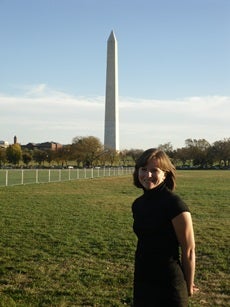- PhD Completion: May 2011 - A spatial and temporal assessment of dune-beach change: Fire Island, New York
Biography
Marvelous life changes and a research science career in coastal change have made Erika’s life rich since the CIIP. Erika and her husband were married in October 2009 under stormy skies in Narragansett—a perfect setting for a coastal geologist where she was able to gaze adoringly at her betrothed while keeping an eye on the breakers pounding the seawall! Erika’s dissertation, which evaluated spatial and temporal changes to the geomorphology of Fire Island—a barrier island centrally located on the south shore of Long Island—was work directly relevant to coastal management and policy, particularly as the island is home to a state and county parks, private communities, and is within the bounds of a National Seashore. Through this work she was lucky to often interact with natural resource managers, researchers in other disciplines, consultants, residents and stakeholders, which required her to continually assess the relevance and potential impacts of my work from a range of vantage points.
True to her CIIP experience, Erika has continued to challenge her lens of bias by putting herself in roles which demand she wear something other than her research hat. Prior to her defense, Erika was able to carve out six weeks in the fall of 2010 to intern in Washington DC for the Science Advisor to the Director of the National Park Service (NPS), where she observed the role of science in decision-making at top levels. After completing her dissertation, Erika continued her Fire Island research for another year through a post-doc at the U.S. Geological Survey and funded through NPS, and was able to publish a journal article exploring long-term changes to the island prior to the passage of Hurricane Sandy, which has been an important contribution to understanding the island’s response to the storm. In 2011, Erika was appointed to the Natural Resources and Coastal Beaches Committee in her town, where as a resident, she confronts and makes recommendations on the issues many coastal communities face through a very different lens, and one which Erika think makes her a better scientist. It was also in 2011 that Erika participated in a week-long training at William Mitchell College of Law in an National Science Foundation funded immersion program which provides training in science communication for legal proceedings from depositions to trial testimonies.
Last year, Erika was awarded a Mendenhall Postdoctoral Fellowship through the U.S. Geological Survey, where she is working with colleagues and multidisciplinary collaborators to build a sea level rise model for the Northeastern U.S. that will be used a decision support tool. Through a formalized structured decision making process, the model has been developed with strong input from the decision-makers that will ultimately be using it from day one, and will be fully integrated into comprehensive landscape change assessment and design predictions concurrently being generated by collaborators. Five months into the project, Erika gave birth to her son in an experience so profound it still leaves her a bit breathless. He requires Erika to stay fully present in the moment in a way nothing else can, and through him she is learning to value and make the most of wherever she is at any given time. And as she juggles work-life demands with his addition in what now feels like glorious Technicolor, she is grateful for the wonderful time she and her husband have taken to see the world in the last few years, from the Pacific Coast, Midwest farmland, Rockies and Sonoran Desert, to Central and South America, to hikes closer to home in the White Mountains. These moments of pause to see the world are to Erika some of the most grounding of all.
Quote: “There will never be enough hours in the day, so we should stop fooling ourselves into thinking that there are. From this perspective, it becomes easier to view life as a series of everyday victories that may consist of a range of accomplishments from eating enough protein to creating a really cool figure to making a bed.”
Selected Publications
See full Curriculum Vita here.

